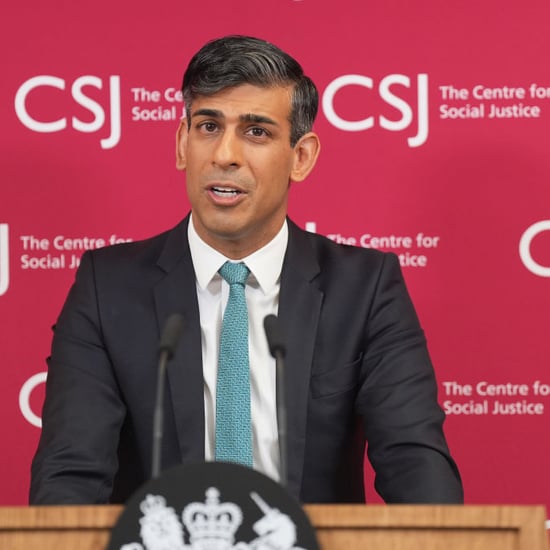How to Protect Your Mental Health as Anti-Gay Slurs Increase
Queer Therapists Share How to Set Boundaries When Homophobia Is on the Rise (Again)

Are the straights OK? In a recent study, researchers reviewed nearly a million tweets posted between January 1 and July 27 and found a 406 percent increase in tweets using "groomer" or "pedophile" since the Florida's "Don't Say Gay" bill was signed into law.
The "Don't Say Gay" bill was one of the many policies brought forth by conservatives' rising anti-LGBTQ+ agenda fuelled by misinformation and fear-mongering. (For example, they directed state health agencies to treat gender-affirming care for trans minors as "child abuse.") Under the Florida law, public school teachers are not even allowed to "encourage classroom discussion about sexual orientation or gender identity."
Most queer people deal with homophobic discrimination in some form IRL — and it's particularly challenging when it's from a family member. "Personally, I have had to set these boundaries many times, which was a very painful process, especially with close relatives," Jared Sulc, APC, a primary clinician and psychotherapist at the Berman Centre in Atlanta, GA, says.
With mounting hate online, in addition to battling the minefield of anti-LGBTQ+ policies, plus waiting for the shoe to drop on the overturning of Roe v. Wade and what it means for the Respect for Marriage Act, *deep breath* mental health should be a priority. And a huge part of taking care of mental health is learning to set boundaries. POPSUGAR spoke with queer therapists who are experiencing these moments as well. Keep reading for the advice they give to their patients and follow themselves.
Practice Setting Boundaries
Start setting boundaries with people by getting clear about your needs and what rhetoric or behaviour is harmful to you, says Sulc. Then, practice what you're going to say if someone crosses that boundary. "Talk to members of your community and allies about what you want to say and how to express it effectively." A trial run before the real conversation builds confidence and courage.
"Have the conversation before it gets heated, and keep the conversation in private so they don't get defencive," says Sara Stanizai, LMFT, founder of Prospect Therapy, a LGBTQ+ affirming practice. Lay out what you're going to do if their behaviour or language continues to be offencive. For example, "I love you and want to go to this dinner but I will leave if this is brought up." If it's family that you're setting boundaries with, consider bringing a buddy as a buffer. Having the conversation moderated by an affirming therapist can also be helpful in these situations.
Don't Feel Obligated to Educate
Stanizai says a lot of the clients she works with can feel guilty for not addressing every homophobic, biphobic, or transphobic comment that is made towards them. But the truth is: "You always have the option to ignore it and protect your peace. I think we forget that's an option," she says. Or, try, "I do want to talk about this but I want to think about it first so it has the respect it deserves."
If you are up for educating someone, try starting with "Hey can I tell you something about that?" to avoid triggering any defenciveness. And enlist other people to help you. Throw it in the group chat for example. "A lot of people are looking for ways to 'prove allyship' so it shouldn't just be on those impacted to have these conversations," says Stanizai. "Sometimes I will practice the dialogue ahead of time with a friend so I feel more confident when I do speak up to get clear on what I think and believe."
Before taking any action, though, evaluate the relationship first. How close is this person to me? "A stranger is not worth ruining your day," she says. If it's a family member or good friend, though, you're probably going to care more about alerting them of their harmful behaviour. Be sure to double check your physical and emotional safety levels before you speak up, because you don't want to put yourself in any danger. Consider asking yourself these assessment questions before confronting someone:
- Are you the only one in the room?
- Is the conversation with someone who is in charge of your livelihood, like a boss or manager?
- What laws can protect you?
- Do you have a designated safe space for you to retreat if you need to leave the situation?
- Are you in the right mental space for a potentially emotionally draining conversation?
Don't See It as a Failure
If you've set a boundary around what you're willing accept from someone and that boundary is crossed, don't blame yourself. "Even if the moment was really painful or disappointing, you will survive this," Stanizai says. Just make sure you give yourself the space to process adequately. That might mean putting physical space between yourself and the other person because being in the same room with them feels too painful or intolerable. Consider sitting in your car or taking a walk to allow for physical distance.
Whatever you choose to do, pay attention to your nervous system during that time: whether it's breathing, going for a jog, drinking some water, screaming into a pillow, just resetting your system, says Stanizai. "I think connection with the body is so important when the freedom to be who you are and love who you love is being threatened," Sulc says.
Also, congratulate yourself for speaking up. "I had to employ radical acceptance of not being able to change other people and changing how I interact with them," Sulc says. "Most anti-LGBTQIA+ beliefs are both religious and political, so they are deeply engrained and constantly reinforced by the media. People in my life would use this rhetoric thinking they were somehow helping me or being righteous. When it's that engrained, you can have the conversation but also be realistic about expectations." Reaching out to someone who will say what you need to hear via text or call can be really helpful after a negative conversation, Stanizai says.
Don't Read the Comments
While we are constantly bombarded by information impacting our rights, we can be intentional about our sources, who we follow, and how much time we spend on the information. "Many platforms leave their comment section open for unmanaged content that allows for tons of negativity including hate speech," Sulc says. "Limiting exposure to this media helps prevent already painful emotions from being intensified and prolonged."
Remember, you are allowed to unfollow and mute people on social media. There are other ways to stay informed. "Set aside time to keep up with the news instead of ingesting 'surprise' information," says Stanizai. "It's important to be critical of where you're getting information. Anybody can make a website, a lot of sources that are pretty biased and can sneak in homophobia and/or biphobia."
Connect with Community
Resilience is the ability to bounce back from painful experiences. "You can develop it within yourself but sometimes you need people around you who understand," Sulc says. "Engageing with safe, supportive groups and spaces can help you build resilience."
For Sulc that meant working to undo the "inaccurate and toxic messages" he received about religion growing up. "Finding a spiritual practice and communities that are inclusive helped me create a connection with myself that grounds me no matter how wild things are in the world right now."
Stanizai suggests spending time with those who understand your experience, "especially if they can relate to the same laws that threaten you." They don't have to be queer, but they should be able to understand your situation without asking more draining questions that can lead to microagressions.
If you don't have the energy to connect IRL, find another relaxing outlet. Watch TV, read a book, or even do a virtual queer yoga class! Seriously, watching a good queer show can make you feel part of something bigger. ("A League of Their Own" is a personal favourite.) And while being queer isn't the most important thing about a person, it's still part of someone's identity and sometimes reading books by queer authors can help with feeling connected to the larger community.
Acknowledge It's Not All in Your Head
"Practicing gratitude does add to your cup but make sure it doesn't have a leak," says Stanizai. "We spend so much time convincing ourselves and others that we 'should just be grateful'." Grateful to be out of the closet, grateful to have a supportive partner or friends, grateful to be alive. "But these disadvantages are really challenging." Instead, reserve your energy by acknowledging that your fears are real.
Same goes for survivor's guilt, which Stanizai says is pretty common among her patients. "You may know people who have had it worse, but people's problems are their problems. We don't need to compete or compare," she says. "You don't have to prove your pain to anybody."






